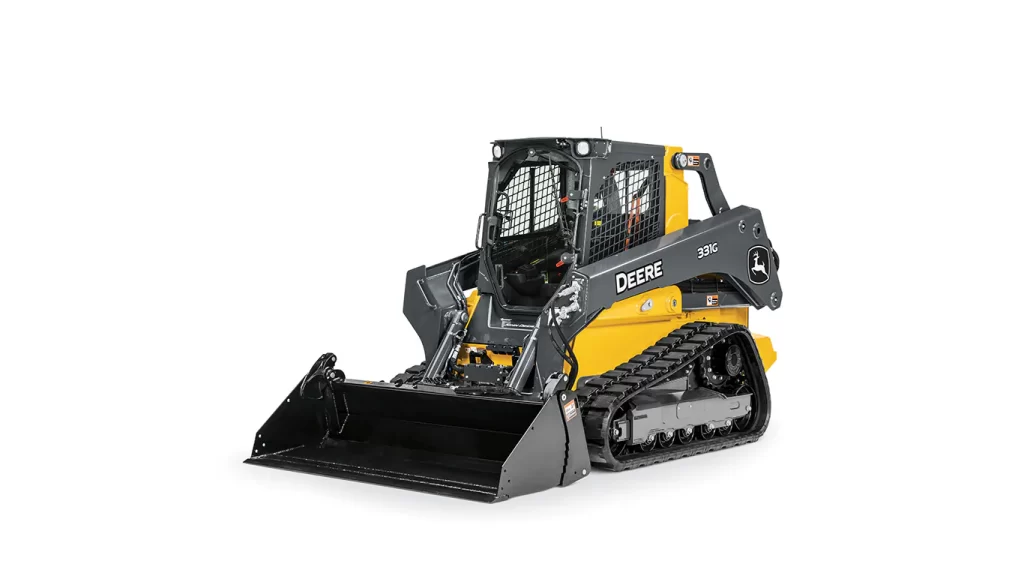John Deere is well known for producing top quality products that are very reliable, versatile, and easy to use. The John Deere 331G is no exception. The track loader is very compact and packs a lot of power and useful features. The track loader is however not perfect and can develop problems. These will be discussed in this article.
Table of Contents
What Is The John Deere 331G?
The John Deere 331G is compact track loader from the manufacturer John Deere. The Compact loader uses 3.1 L, 4-cylinder turbocharged Yanmar 4TNV94FHT diesel turbo intercooled engine that produces 91.2HP (68 KW) rated power. A 2-speed transmission and a high drive planetary reduction gearbox for greater power delivery. Rubber tracks with steel inserts, and hydraulic wet disc brakes are also used for greater control and handling of the John Deere 331G track loader. The hydraulic system has a pump with a rated capacity of 23.5 gpm (89 Ipm) and a pump pressure of 3 450psi (238 bar).
John Deere 331G Problems
NB: The John Deere 331G is usually sold without any problems or defects. Any problems that may develop on the track loader, including those mentioned below are usually caused by misusing the track loader. Wear and tear can also develop on the tractor leading to its deterioration.
1. Engine Starts And Shuts Off
The engine is very crucial in the John Deere 331G since it runs almost all the functions of the track loader hence if the engine starts and immediately shuts off the problem could be caused by;
- Dirty air filter or clogged fuel filter element.
- Loose connections in the fuel injection pump and defective or clogged fuel injectors.
- Damaged fuel injection pump.
Troubleshooting Engine Fault
To address the problems with the engine and ensure the engine doesn’t shut off when started one can try the following;
- Servicing and replacing the air filter, and replacing the fuel filter when clogged.
- Tightening the fuel injection pump connections and replacing or cleaning the fuel injectors.
- Repairing the fuel injection pump or replacing it when damaged.
2. Engine Shuts Off Suddenly
The engine can suddenly shutoff when it is not operating in its optimum condition. Reasons for the engine suddenly shutting off can include;
- Engine not being warmed up to the correct temperature.
- Fuel filter being plugged or air in the fuel lines.
- Clogged or defective injection nozzles and improper fuel injection timing.
Troubleshooting Engine Shutting Off Suddenly
When the engine shuts of suddenly while running the problem can be addressed by;
- Warming the engine to the correct temperature before loading the track loader.
- Changing the fuel filter element and bleeding the fuel lines of any air.
- Installing a new injection nozzle kit that has correctly balanced nozzles and setting the fuel injection timing to the correct settings.
3. Forward And Backward Movement Failure
One problem that can plague the John Deere 331G is that the engine is operating normally but the track loader is failing to move in the forward or reverse direction. This problem can be caused by;
- Insufficient hydraulic oil and blocked or damaged undercarriage tracks.
- Relief valve not operating correctly or plugged suction line and hydraulic filter.
- Faulty hand or foot controls or damaged drive pump and motor.
Troubleshooting Movement Failure
When the John Deere 331Gtrack loader fails to move in the forward or reverse direction the problem can be addressed by;
- Adding hydraulic oil to the correct level and repairing or correcting the blockage in the undercarriage tracks.
- Servicing or changing the relief valve and checking, cleaning, or changing the suction line and hydraulic filter when plugged.
- Inspecting and repairing the faulty hand and foot controls. One should also inspect and change the drive pump and motor when damaged.
4. Hydraulic System Overheating
The hydraulic system may start overheating and if this happens, the problem may occur because;
- The hydraulic pressure is incorrectly adjusted.
- The main relief valve is improperly adjusted or is failing. The hydraulic oil may also be contaminated.
- There is a lack of hydraulic fluid in the system or there is a defective hydraulic pump.
Troubleshooting Hydraulic System Overheating
When the hydraulic system starts overheating the following can be done to try and address the problem;
- Setting the hydraulic pressure to the correct level.
- Adjusting the main relief valve to the correct setting and replacing it when necessary. Also ensure to change the hydraulic oil when contaminated.
- Checking and refilling the hydraulic fluid and changing or repairing the hydraulic pump when necessary.
5. Boom Not Lowering Or Raising
The boom is used to carry heavy loads hence its lowering and raising is very important. If the boom stops lowering or raising, the problem could be caused by;
- Lift controls or hydraulic pump failure.
- Defective hydraulic control valve or faulty hydraulic cylinder.
- Insufficient hydraulic fluid.
Troubleshooting Boom Raising Problem
When the boom refuses to be properly lowered or raised, the problem can be addressed by;
- Changing or repairing the lift controls and repairing or installing a new hydraulic pump.
- Repairing or replacing the faulty hydraulic control valve, together with the hydraulic cylinder.
- Checking and refilling the hydraulic fluid until it reaches the correct level.
6. Battery Does Not Charge
The battery is a very critical component of the John Deere 331G and without it one can’t start the engine. The battery can however develop problems and fail to charge This problem may be caused by;
- Loose or corroded electrical wire connections.
- Defective electrical terminal connectors.
- A worn or loose belt. It can also be caused by a bad or worn battery.
Troubleshooting Battery Problems
To address battery charging problems the following can be done;
- Servicing or replacing the corroded electrical wires and tightening the loose wire connections.
- Replacing the defective electrical terminal connectors.
- Adjusting the belt tension or changing the loose belt. Also ensure to change the battery when it becomes bad or worn.
How To Avoid John Deere 331G Problems?
The best way to avoid any problems developing with the John Deere331G is to regularize with the track loader’s operator manual and only using the track loader as stated in the manual to avoid any faults. It is also advisable not overload the track loader or to exceed its rated capacity to ensure no problems develop with it.
What Is The Operating Capacity Of The John Deere 331G?
The rated operating capacity of the John Deere 331G is 3,100 pounds
What Is The Flow Rate Of The John Deere 331G?
The John Deere 331G pump flow rate is 36.5 gpm, making it a high-flow skid since the hydraulic fluid flow rate is between the 30 to 45 gpm range.
Conclusion
In conclusion the John Deere 331G is wonderful track loader that can handle a great deal of work and outperform other competitors in demanding situations. The track loader is however not perfect, and problems can develop with it, hence ensure it is properly taken care of and maintained if it is to last a long time.

